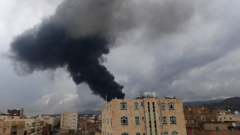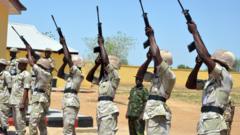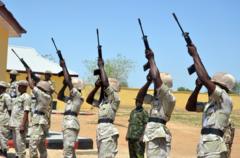In a series of retaliatory air strikes, Israel has targeted Houthi positions in Yemen’s capital, Sanaa, following a missile attack from the Iran-backed group that reportedly employed cluster munitions. On Friday, the Houthi strike elicited a swift response from the Israeli military, which described the incident as the first instance of cluster bomb usage by the Houthis during the ongoing conflict with Israel.
Israel Strikes Back at Yemen's Houthis After Cluster Bomb Attack

Israel Strikes Back at Yemen's Houthis After Cluster Bomb Attack
Israeli military responds to Houthi missile strike using controversial munitions over the weekend.
The Israeli operation focused on key military sites, including a military complex that encompasses the presidential palace, fuel depots, and power stations. While the missile attack resulted in only minimal damage, Israeli officials are conducting an investigation to determine why the missile was not intercepted before the munitions were deployed. Cluster munitions, banned by over 100 nations, disseminate smaller bomblets that pose significant dangers, particularly when remaining unexploded.
Israeli Prime Minister Benjamin Netanyahu and Defense Minister Israel Katz oversaw the operation, asserting Israel’s commitment to retaliate against attacks. “Anyone who attacks us - we attack them. Anyone planning to attack us - we attack them,” stated Netanyahu from the command center in Tel Aviv. Furthermore, following the strike, the Houthis released footage demonstrating the mid-air dispersal of the bombs.
In a related incident, one bomblet reportedly landed in the yard of a home in central Israel, causing slight damage. The ongoing conflict between Israel and the Houthis has intensified since the recent outbreak of hostilities with Hamas, as the Houthis have launched several missiles towards Israeli territory and conducted strikes on commercial vessels in the Red Sea, framing their actions as support for the Palestinian cause. This situation underscores the complexity of regional dynamics, especially involving Iranian support for the Houthis, which has also involved the use of cluster munitions in previous confrontations with Israel.
Israeli Prime Minister Benjamin Netanyahu and Defense Minister Israel Katz oversaw the operation, asserting Israel’s commitment to retaliate against attacks. “Anyone who attacks us - we attack them. Anyone planning to attack us - we attack them,” stated Netanyahu from the command center in Tel Aviv. Furthermore, following the strike, the Houthis released footage demonstrating the mid-air dispersal of the bombs.
In a related incident, one bomblet reportedly landed in the yard of a home in central Israel, causing slight damage. The ongoing conflict between Israel and the Houthis has intensified since the recent outbreak of hostilities with Hamas, as the Houthis have launched several missiles towards Israeli territory and conducted strikes on commercial vessels in the Red Sea, framing their actions as support for the Palestinian cause. This situation underscores the complexity of regional dynamics, especially involving Iranian support for the Houthis, which has also involved the use of cluster munitions in previous confrontations with Israel.

















